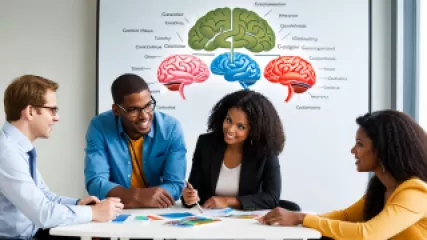Demystifying Cognitive Theories of Intelligence
Welcome to the ultimate guide to demystifying cognitive theories of intelligence. In this comprehensive article, we will delve into the fascinating world of intelligence theories, exploring their origins, key concepts, and implications. Whether you're a student, educator, or simply curious about the nature of intelligence, this guide will provide you with valuable insights and knowledge.
Introduction
Intelligence is a multifaceted concept that has intrigued scholars, psychologists, and philosophers for centuries. Over time, various cognitive theories have emerged, seeking to explain and measure intelligence. From the early developments of IQ tests to the more recent focus on emotional intelligence, these theories have shaped our understanding of human cognition.
In this guide, we will explore the major cognitive theories of intelligence, including their historical context, main proponents, and central ideas. We will also examine how these theories have influenced educational practices, psychological research, and our everyday lives.
Theories of Intelligence
1. The Psychometric Approach
The psychometric approach to intelligence focuses on the measurement and quantification of cognitive abilities. One of the most influential figures in this field was Charles Spearman, who proposed the concept of general intelligence or "g factor." According to Spearman, intelligence could be understood as a single underlying factor that contributes to performance across different cognitive tasks.
Spearman's work laid the foundation for the development of IQ tests, which aim to assess an individual's intellectual abilities objectively. These tests typically measure various cognitive domains, such as verbal comprehension, spatial reasoning, and logical thinking. IQ scores are often used to predict academic success, job performance, and other aspects of life.
2. Multiple Intelligences Theory
In contrast to the psychometric approach, Howard Gardner proposed a theory of multiple intelligences. According to Gardner, intelligence is not a unitary concept but rather a collection of distinct abilities. He identified several types of intelligence, including linguistic, logical-mathematical, spatial, musical, bodily-kinesthetic, interpersonal, intrapersonal, and naturalistic.
Gardner's theory highlights the diversity of human cognition and challenges the notion that intelligence can be adequately measured by a single test. This perspective has had a significant impact on education, emphasizing the importance of fostering a broad range of intellectual abilities and accommodating different learning styles.
3. Triarchic Theory of Intelligence
Robert J. Sternberg proposed the triarchic theory of intelligence, which posits that intelligence consists of three related components: analytical, creative, and practical. Analytical intelligence involves problem-solving, logical reasoning, and critical thinking. Creative intelligence encompasses the ability to generate novel ideas, think outside the box, and adapt to new situations. Practical intelligence refers to the application of knowledge and skills in real-world contexts.
Sternberg's theory emphasizes the importance of considering how individuals use their intelligence to navigate everyday challenges. It provides a framework for understanding how different cognitive processes interact and contribute to intelligent behavior in various domains of life.
4. Emotional Intelligence
In recent years, there has been growing interest in the concept of emotional intelligence (EI). Developed by Peter Salovey and John D. Mayer, EI refers to the ability to perceive, understand, and manage emotions effectively. It encompasses skills such as self-awareness, empathy, emotional regulation, and social competence.
Emotional intelligence plays a crucial role in interpersonal relationships, leadership, and overall well-being. It complements traditional measures of intelligence by recognizing the significance of emotional awareness and interpersonal skills in navigating social interactions and achieving success.
Implications and Applications
1. Education
Theories of intelligence have profound implications for education and learning. By understanding the diverse ways in which individuals acquire knowledge and solve problems, educators can tailor their teaching methods to accommodate different intelligences and learning styles.
For example, a teacher who recognizes the presence of musical intelligence in a student may incorporate music and rhythm into the curriculum to enhance their learning experience. Similarly, acknowledging the interpersonal intelligence of another student could involve group activities and collaborative projects to foster their social skills.
2. Personal Development
Understanding cognitive theories of intelligence can also benefit personal development. By recognizing our own strengths and weaknesses, we can leverage our intellectual abilities effectively and pursue areas of interest and passion.
For instance, someone with high logical-mathematical intelligence may excel in problem-solving careers such as engineering or computer science. On the other hand, an individual with strong intrapersonal intelligence may find fulfillment in fields that require self-reflection and empathy, such as counseling or coaching.
3. Workplace Dynamics
Intelligence theories have practical implications for the workplace as well. Recognizing and valuing different types of intelligence can contribute to more inclusive and productive work environments.
By embracing diverse perspectives and skill sets, organizations can harness the collective intelligence of their employees. This can lead to enhanced creativity, innovation, and problem-solving, ultimately driving success and growth.
Conclusion
Cognitive theories of intelligence provide valuable frameworks for understanding the complexities of human cognition. From the psychometric approach to multiple intelligences, these theories shed light on how we think, learn, and interact with the world.
By exploring the historical context, main ideas, and practical implications of these theories, this guide has aimed to demystify the concept of intelligence. Remember that intelligence is a multifaceted concept that extends beyond traditional measures such as IQ tests. Emotional intelligence, creative thinking, and practical problem-solving skills are all essential components of human cognition.
Whether you're a student, educator, or simply intrigued by the nature of intelligence, we hope this guide has provided you with valuable insights and sparked further curiosity in this fascinating field. Embrace your unique intellectual abilities and continue exploring the wonders of the human mind.






